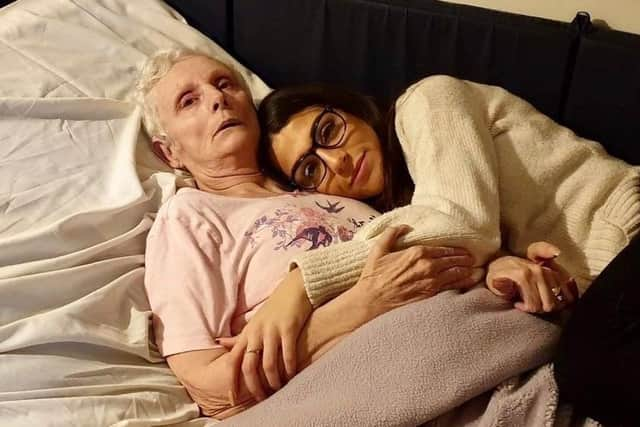Inspirational woman took on second job to care for nan with Huntington's disease in care home
The now 25-year-old, from North Yorkshire, was already working 40 hours a week in an NHS HR role, but successfully applied for a second job at the home in Newton Aycliffe, where she would spend evenings and weekends caring for its residents. Her nan, Lin Porter, was unwell with the impact of Huntington’s disease, a hereditary, progressive neurological condition that stops parts of the brain from working properly over time.
Charlotte’s mother, Elaine, is in the middle stages of the disease and Charlotte, who now lives in Teesside, also has a 50 per cent chance of inheriting it. At the end of the month, she will fly to Tanzania to climb Mount Kilimanjaro with eight other people impacted by rare disease. Charlotte will be raising money for the Huntington’s Disease Association and the Huntington's Disease Youth Organisation, for which she is an ambassador.
Advertisement
Hide AdAdvertisement
Hide Ad“There’s such a lack of awareness not even just about Huntington’s but diseases similar,” Charlotte says. “It’s about being kind and gracious. How you see somebody presenting out in public might not actually be what you think. People would accuse my nan of being drunk but things aren’t always necessarily as they seem. You don’t know what people are going through.”


Charlotte’s family history of Huntington’s was discovered during a post-mortem examination of her great-nan, which revealed that she had the condition. Testing then showed that Lin and Elaine had the Huntington's disease gene. The condition affects the body’s nervous system and leads to progressive deterioration – physically, cognitively, and mentally.
Charlotte recalls symptoms beginning to emerge in her nan around the year 2005. The condition caused her to have involuntary movements and impacted her speech. As the disease progressed, Lin struggled to eat, talk or walk. When the pandemic hit, Charlotte and her family went from regularly visiting her nan at Defoe Court Care Home to seeing her only twice between February and September 2020.
“When the privilege of visiting anytime was taken away with government restrictions things became ridiculously tough for her,” Charlotte explains. “She couldn’t communicate by speech so talking on the phone or facetime was difficult. Both visits were outside, nan wasn’t even up to getting out of bed, never mind hoisted into a chair and sitting outside. During the visits, she became extremely agitated and cried non-stop and she didn’t understand why she couldn’t touch us or come close. It was really traumatic.”
Advertisement
Hide AdAdvertisement
Hide AdThe confusion and trauma took its toll on Lin. “To her it probably seemed like we’d just abandoned her all of a sudden and weren’t going in,” Charlotte says. In a matter of months, Lin lost more than 10kg.


Looking for a way to support her nan’s complex needs and to try and stop her increasingly rapid deterioration, Charlotte applied for a position as bank staff at the care home. Her experience in caring for her nan and her mum saw her secure the job. Charlotte worked at the home from September 2020 until her nan’s death in December 2021. She assisted residents with physical and emotional care, building relationships at a time when their families were subject to visiting restrictions.
“My nana was the first resident with Huntington’s disease the carers at Defoe Court had looked after,” Charlotte recalls. “They were brilliant and always wanted to learn more. This was so far from the experiences we’d had before; previous homes had struggled with my nan's symptoms and neglected her due to the complexity of her illness.”
The Huntington’s Disease Association run a care home accreditation to improve the knowledge and standard of care for people in care homes with the condition. “I think there’s a lot to be done in care homes to ensure that they’re safe and supportive environments for Huntington’s disease residents,” Charlotte says.
Advertisement
Hide AdAdvertisement
Hide AdSince she was 18, Charlotte has been seeing a genetic counsellor. “Compared to another terminal illness that might not impact more than one person [in the family], with Huntington’s you’re almost looking your future in the face...There isn’t a day that goes by where you don’t think about Huntington’s disease or what your life might be like.”
To support Charlotte, visit https://gofund.me/61b6b019
